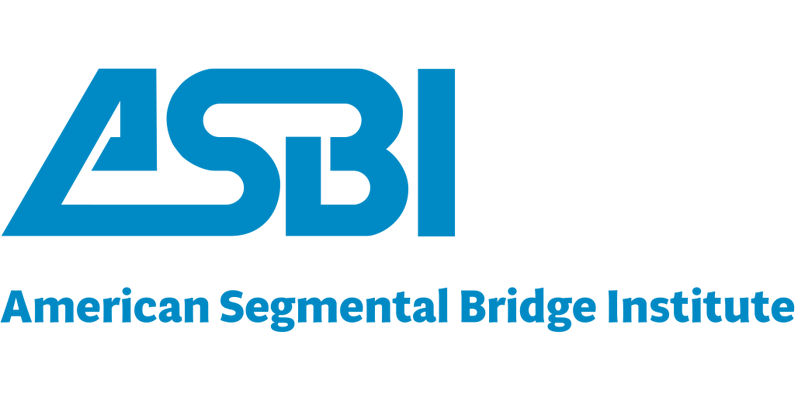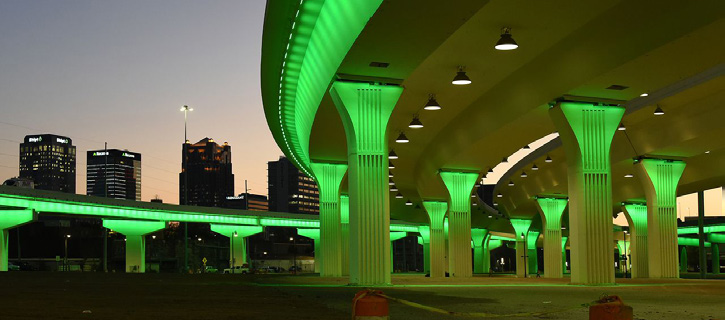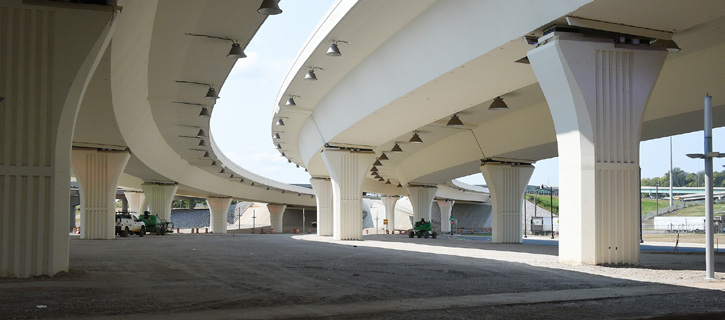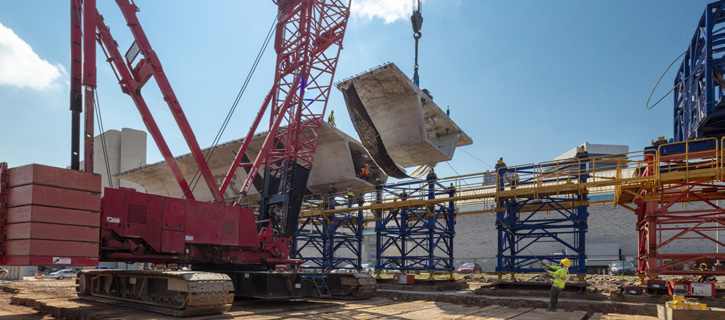I-59/20 Birmingham Central Business District Bridges – Birmingham, Alabama
The I-59/20 Birmingham CBD Bridges carry heavily traveled Interstates 59 and 20 through downtown Birmingham. The original structures were designed for 80,000 vehicles per day but current traffic exceeds 160,000 and the bridges exhibited signs of deterioration due to age and use. Alabama DOT decided to replace the CBD Bridges, creating a new, higher capacity highway. The new bridges carry up to six travel lanes and shoulders both directions. Alignments follow the original, with construction progressing with demolition. Separate eastbound/ westbound structures, each approximately 6,500’ long, carry mainline traffic. Each bridge is comprised of two precast segmental concrete box-girders joined by a longitudinal closure strip. In total, this includes 172 spans and 2,316 superstructure segments. Average span lengths of 165’ were constructed in the span-by-span fashion.
Innovation of Design and/or Construction
A precast segmental concrete box-girder bridge was the only option that could be erected within the mandated 14-month closure. This allowed for offsite precasting with fast erection times. The precast segmental concrete option also offered increased span lengths, improved durability, and aesthetics.
Substructure challenges included limited right-of-way, utility conflicts, varying geotechnical conditions along the corridor, and limited vertical clearance under existing structures for pre-closure foundation work. The new bridges are in the same footprint as the original. The new columns were strategically located during design to avoid the original foundations. This allowed substructure work to begin prior to closure. The substructure included elements that could be installed with low-height equipment, allowing work to commence prior to closure.
The design team utilized single column piers placed under each segmental girder line. The Contractor elected to precast piers as separate columns and caps. Reinforcement for pier sections was made continuous with grouted couplers, allowing for faster pier construction once demolition was completed. Prior to closure of I-59/20 and due to limited vertical clearance, Johnson Bros. built as many of the footings that could be constructed using low overhead equipment to install drilled shafts, micropiles, and steel h-piles. The footings were covered with fill for protection prior to demolition.
The superstructure design featured elements that could be precast and erected quickly. By standardizing many common elements, the Contractor would be able to work in “assembly-line” fashion. The casting yard was four miles away, allowing precast concrete segments to be easily transported. The Contractor utilized a unique technique, erecting each span on falsework towers, with each segment supported individually, allowing work on up to eight spans simultaneously, facilitating non-linear construction. By interstate closure, 1,000 segments were cast and ready for erection. All segments were erected in 217 days.
Rapid Construction
ALDOT decided to allow I-59/20 to be closed for 14 months of construction. The contractor was given an incentive/disincentive of $250,000/day, with the maximum bonus capped at $15 million. The I-59/20 corridor reopened to traffic on January 17, 2020, two months early. The entire process was efficient; demolition was completed in just over half the allotted 90 days. Seventy percent of foundations were installed before demolition. During peak construction, up to 400 superstructure segments were installed per month. By July 2019, 50% of bridge segments were in place; the last precast sections were delivered and installed in October 2019.
Aesthetics and/or Harmony with the Environment
The highway passes through Birmingham’s Central Business District, adjacent to many local landmarks. The new viaduct has a sleek, modern appearance meshing with downtown, projecting a vibe of renewal and growth; a new 10-block, 31-acre project, CityWalk BHAM, will be constructed under the highway with a mix of amenities. Bridge height was maximized to provide a sense of openness along the corridor. Columns under each individual girder line were aligned to minimize visual disruption; column design was single-column piers with vertical fluted lines.
Cost Competitiveness
In planning projects, ALDOT considers the cost/benefit ratio, usually between $1,000-$8,000 per motorist; this project falls between $2,000-$3,000, making it highly cost-effective. The I-59/20 Birmingham CBD Bridges cost was $195 million, or approximately $190 per square foot. This was a cost competitive project that will last for many decades into the future. The challenges and time constraints of this project proved how beneficial segmental bridge design and construction can be.
Minimization of Construction Impact on the Traveling Public
The most efficient way for this project to be constructed was for the entire one-mile downtown segment of highway to be closed to traffic for a year. There was extensive outreach and publicity about the impending closure, so travelers could plan to use nearby I-459 instead. The project-dedicated web site featured detailed detour maps. Travelers could also use ALDOT’s project hotline for information and updates. The shorter construction duration also meant a quicker return to normal traffic conditions. Allowing the construction team unimpeded access to the site was a win-win for everyone.
Jury Comments
This project showcased what a successful segmental bridge can be: efficient design, minimizing traffic interruption, contractor/designer optimization of construction techniques through several challenges (urban setting, changing foundations, short construction schedule). The clean aesthetics will allow the city to utilize the open areas and color options to truly create a gathering place under the bridge. An outstanding application of segmental construction noteworthy for the innovative erection method of using conventional cranes and supporting the segments on falsework towers rather than an overhead gantry or underslung trusses allowed work on multiple headings to meet the 14-month project schedule.
2021 ASBI Bridge Award of Excellence
Category: Urban Bridges
State:
Alabama
Owner:
Alabama DOT
Owner’s Engineers:
Volkert, Inc.
Designer:
Corven Engineering Inc./Hardesty & Hanover (Superstructure) Volkert, Inc. (Substructure)
Contractor:
Johnson Bros. Corporation, a Southland Company and Oscar Renda Contracting (JV)
Construction Engineering Services:
McNary Bergeron & Associates and Infrastructure Consulting and Engineering
Constructability Review/Estimating Services:
Armeni Consulting Services, LLC
Construction Engineering Inspection:
Volkert, Inc.
Precast Producer:
Johnson Bros. Corporation
Formwork for Precast Segments:
Structural Technologies (VSL)
Erection Equipment:
Structural Technologies (VSL) and McNary Bergeron & Associates
Post-Tensioning Materials:
Structural Technologies (VSL)
Bearings:
Scougal Rubber
Expansion Joints:
D.S. Brown Company
Epoxy Supplier:
SIKA Corporation
Prepackaged Grout:
BASF Masterflow






